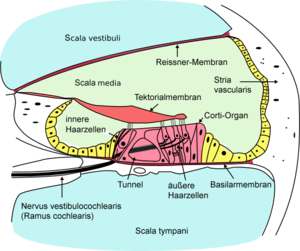Alfonso Corti
* 22.06.1822 in Gambarana † 02.10.1876 in Corvina San Quirico
1841 Study of medicine in Pavia
1845 Employment as an assistant for Hyrtl in Vienna
1847 Conferral of a doctorate
1848 Transition to work for Valentin in Bern
1850 Transition to work for Kölliker in Würzburg (interrupted through an abidance in Utrecht)
1851 Left Würzburg to stay in Paris and Turin
1852 Death of his father, release of his last scientific publication
1855 Marriage and removal to Mazzolino
The forgotten Scientist
When searching for an eminent scholar at the Julius-Maximilians-University, the researcher will primarily find the names of famous and internationally known scientists like Kircher, Fischer or Röntgen. For that reason, great personalities can easily be overseen, even though they are equally relevant to their scientific field, but simply made the decision not to stick with their scientific career, but to move on with their lives. This is also the case for Alfonso Corti. The italian scientist can be credited for the groundwork of most of our modern knowledge about the inner ear of mammals, including humans.
Pioneer of the inner ear
One of Corti’s first discoveries was the lamina spiralis membranacea (a thin bony shelf inside the inner ear) and the ganglion in the centre of the spiral. It should be especially highlighted, that he made precise descriptions about his findings, even though his technical instruments were only simplistic and primitive. Moreover does the organon spirale (“Organ of Corti”), which was discovered by the italian scientist in 1859, still carry his name until today. It also enabled him to find transferring points between mechanical stimuli (sound waves) and nerve signals, even though he could not make more specific allegations about the latter.
Highlights in Würzburg
During his time in Würzburg, Corti had friendly relations to well-known scholars like Kölliker and Virchow. It was also thanks to Kölliker, that the “Organ of Corti” was named after his discoverer, as he suggested using this term.
All in all, his abidance in Würzburg can be seen as the highlight of Corti’s scientific career of just 7 years. The death of his father in 1852, as well as his marriage with a rich italian woman made him shift his interest from medical science to administrational tasks.
Recommended Readings:
Kley, Walter: Alfonso Corti (1822-1876) – Discoverer oft he Sensory End Organ of Hearing in Würzburg, in: Journal for Oto-Rhino-Laryngology and its Related Specialities, Bd. 48 (1986), S. 61-67.
Wyklicky, Helmut/Schmidt, Gabriela: Über Alfonso Corti (1822-1876), einige seiner Biographen und seine Beziehung zu Wien, in: Laryngo-, Rhino-, Otologie, Bd. 70-03 (1991), S. 161-163.



